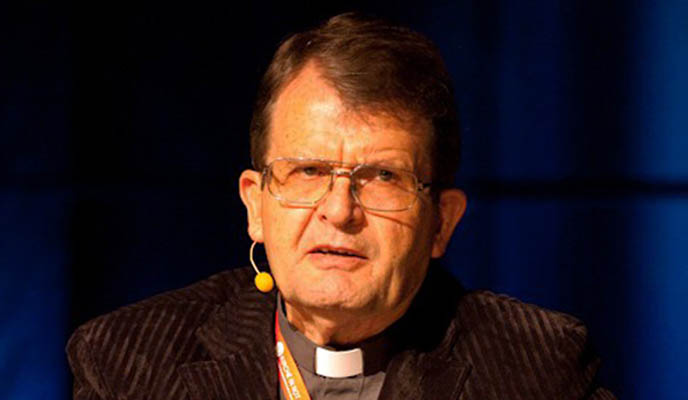
Guest Column: Fr Oskar Wermter sj
When Donald Trump took over as the President of the United States, he demanded that the arsenal of weapons for the fighting forces he commands must be increased drastically.
Americans take it for granted that every citizen has the right to “bear arms” for self-defence. The powerful American Rifle Association absolutely insists on this right and refuses any change of the law, even at a time when abuse of arms is common and a more restrictive law is absolutely necessary, precisely in order to defend human life and stop random killings.
Going back very far into history, we find that men regarded possessing lethal weapons as their prerogative and privilege; a confirmation of their manhood and a tool of male power and domination. This is what made them men and distinguished them from unarmed women. There was only one significant exception to this rule: The Christians of the first three centuries refused to do military service and “bear arms”, remembering Jesus’ warning, “All who draw the sword will die by the sword”.
Any lethal weapon was regarded as a symbol of their power and domination, and as a deterrence and threat of violence to any potential enemy. Military parades displaying a rich arsenal of sophisticated weaponry still serves this purpose even today. Armed soldiers are still being used in many countries, our own included, for intimidation and political subjugation.
When eventually the church made its peace with the Roman Empire, armed forces became acceptable, and morally the concept of a “just war” (= defensive war) became a justification for armed military intervention. This ideology is still very strong until now, even in the thinking of christians. Political thinkers and historians cannot forget the “Cold War” that succeeded the “Hot War” after 1945 (World War II) which ended with atomic bombs being dropped on Hiroshima and Nagasaki, finally breaking the resistance of Japan in their conflict with the United States. Increasing the armament on both sides (The US–Soviet Empire) resulted in a state of “mutual deterrence” and gave the Western world a break of peace of 44 years (1945 — 1989), not counting many regional conflicts, especially in Asia (Vietnam), Africa (Congo, Great Lakes) and Latin America (Nicaragua, El Salvador, drug wars).
This “mutual deterrence”, especially if it is based on nuclear weapons (for example, India and Pakistan), is a very delicate and dangerous balance between military powers; it does not give the world true security or genuine peace. Is piling up military hardware, which is intimidating and regarded as a threat deterring the enemy, a means to stop military conflicts? Philosophers of war and peace call it “redemptive violence”.
This euphemism sounds good, but the reality may be very bad. This phrase (“redemptive violence”) defies logic. Can violence do away with violence? Can war, bring about peace? Is warfare not increasing the destructive power of armed conflicts? Can war which causes death and destruction, lead to freedom and prosperity? This is a very relevant question for us in post-Independence Zimbabwe.
- Chamisa under fire over US$120K donation
- Mavhunga puts DeMbare into Chibuku quarterfinals
- Pension funds bet on Cabora Bassa oilfields
- Councils defy govt fire tender directive
Keep Reading
The industrial-military complex is an economic powerhouse and produces huge profits for the “merchants of death” ( arms traders) . Governments hesitate to forego this source of income for their industrial complex. Once you have accumulated much military hardware, and are proud of your arsenals of powerful and have a standing army of professional fighters ready to kill, it must be very tempting for political leaders to buttress that power with the actual involvement in war. Arms traders may do more than supply equipment for armies in defending their countries. Their flooding the market with guns and rockets, military transport, communication equipment and even spacecraft for a new kind of war, may, in fact, incite military conflicts where political and diplomatic interventions may have been sufficient in settling crises between nations. Do governments buy arms to start a war or to stop one? Power is a temptation that a well-equipped military force cannot resist. A full arsenal of guns may start bloody conflicts that initially nobody wanted. Once guns have been delivered to one conflict zone, they will find fighters that will make use of them even elsewhere. In not yet fully liberated and conflict-ridden Africa, for instance, there is always a market for machine guns. The arms trade does not seem controllable. It is shocking to see military budgets that exceed national healthcare or educational budgets. If the funds to fight poverty are bigger than what the military consumes, what are our priorities? Living people or killing machines? If leaders base their power on the military, then has our democratic vote any value at all?
Medically speaking, we can cope with most epidemics and infectious diseases of children. But are we prepared to spend our taxes accordingly?
The number of women dying in childbirth is shocking. Are men accepting their responsibility for the mothers of their children? Or are they more concerned with military and political power than with human life? Is our conscience underdeveloped? Is its voice no longer heard? Are we morally deaf?
The sick and the dying, the poor and the neglected have been put into our hands. The message we hear in the Gospel is unambiguous. I am happy to see young nurses taking care of their grannies and young men and women training as ambulance drivers. We may be able soon to shoot adventurous space travellers to the moon.
We develop rockets that will be even more dangerous carriers of nuclear weapons annihilating huge populations in balls of fire.
Are we aware of what we are doing by accumulating ever more efficient death dealing bombs? Is that what the Maker of this world created us for?
Fr Oskar Wermter SJ is a social commentator











